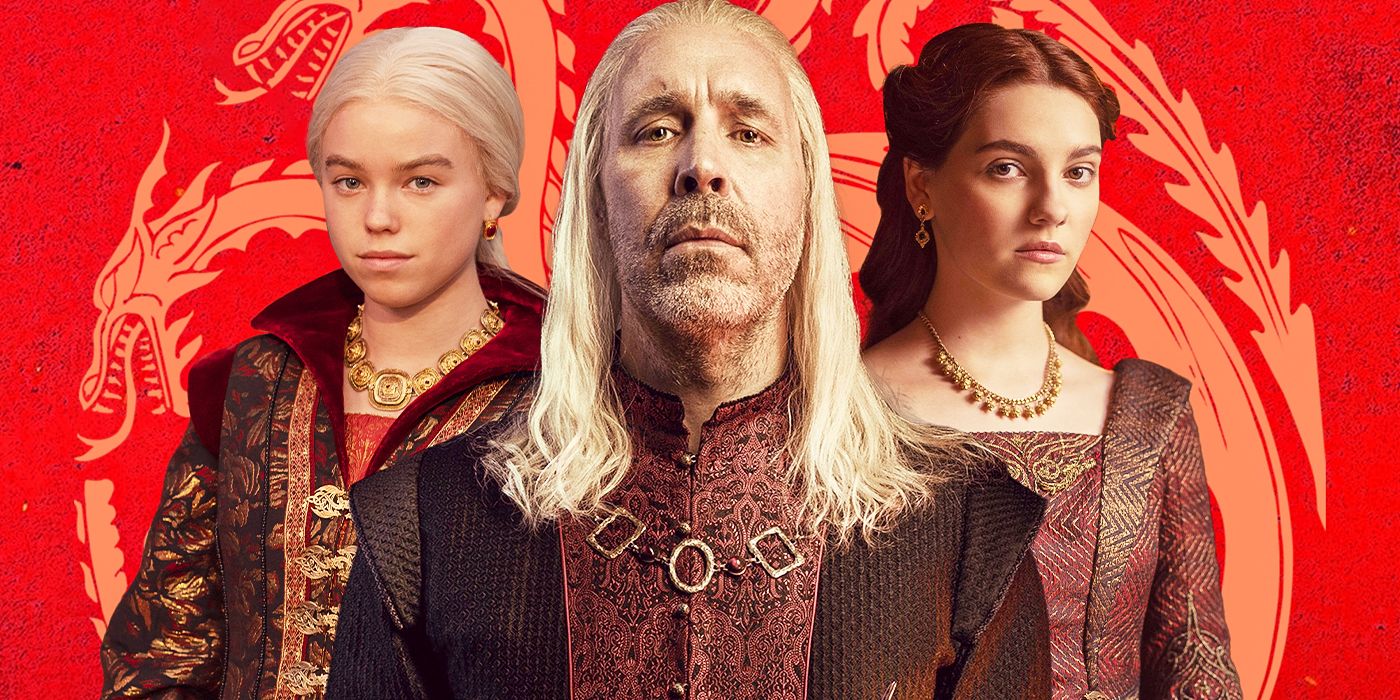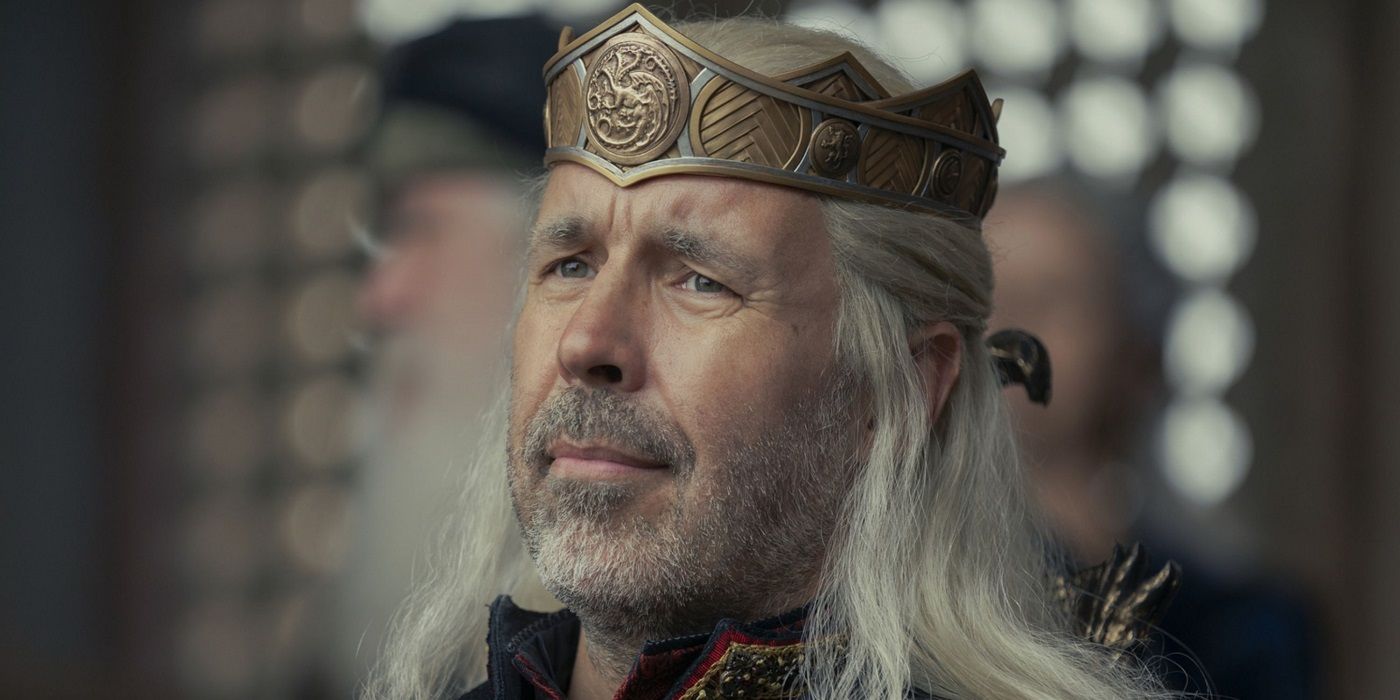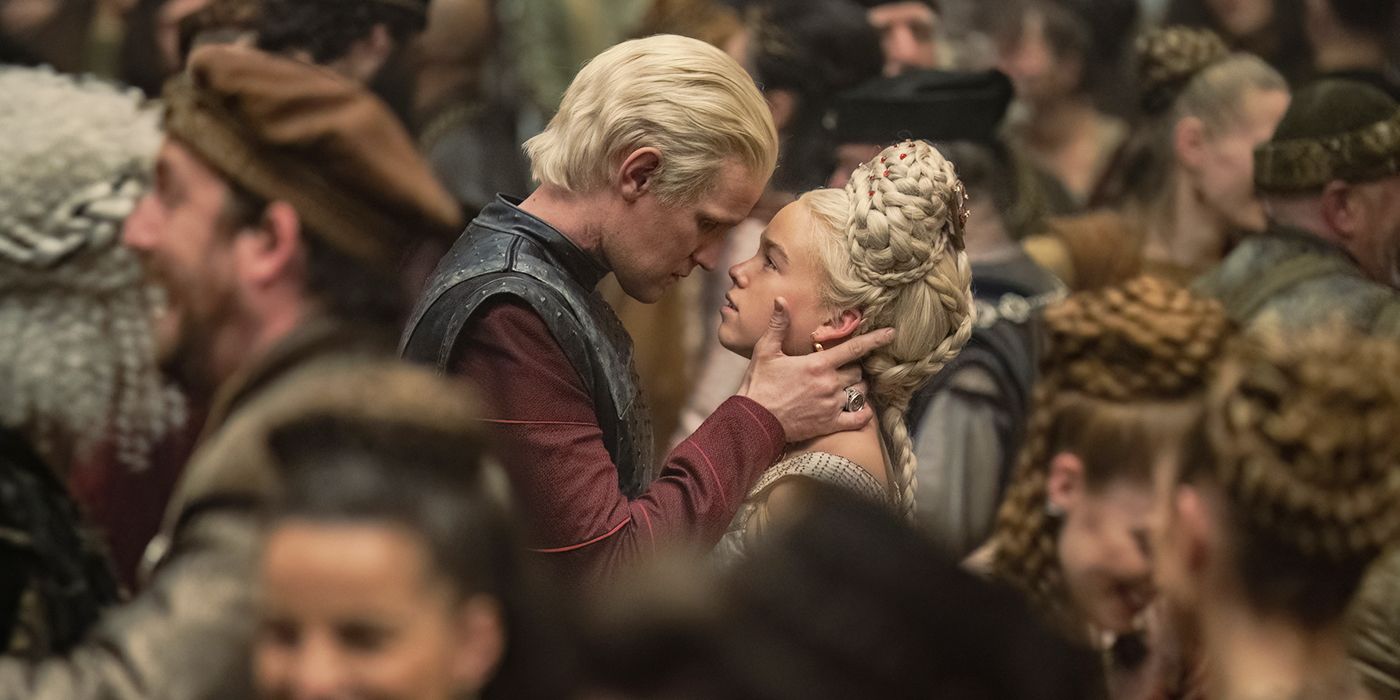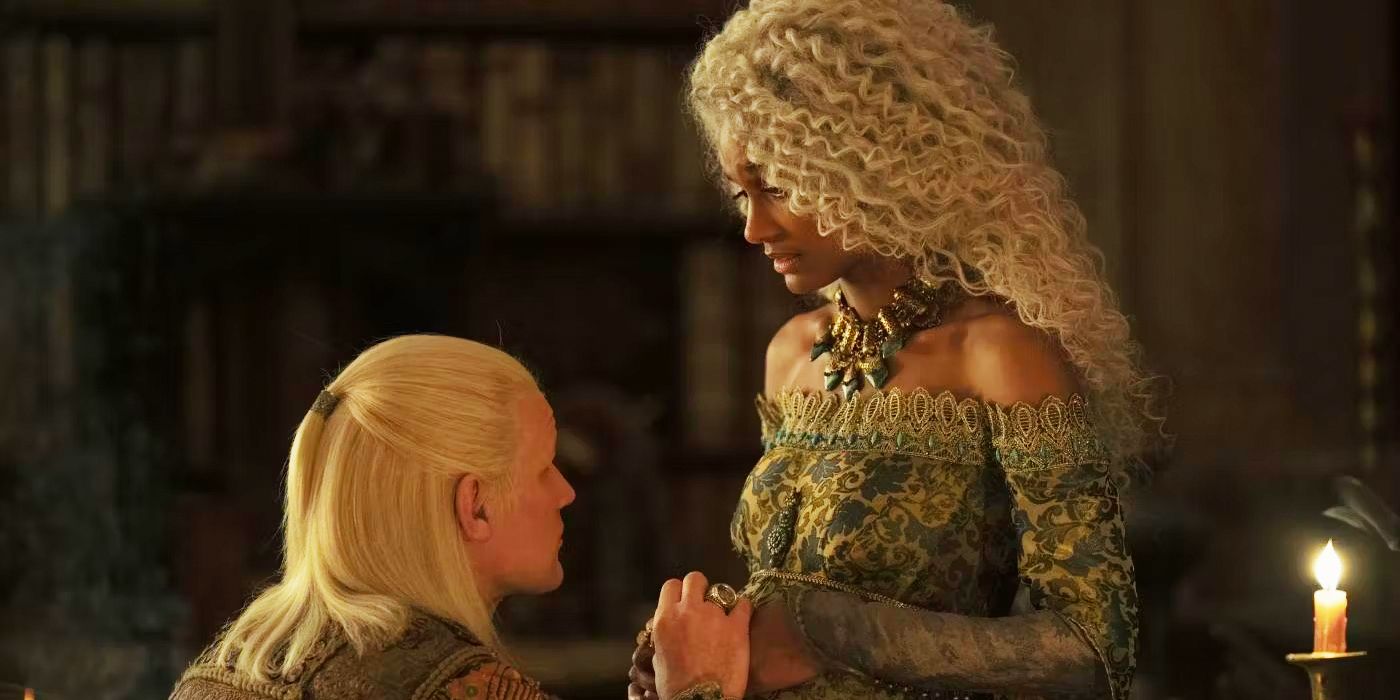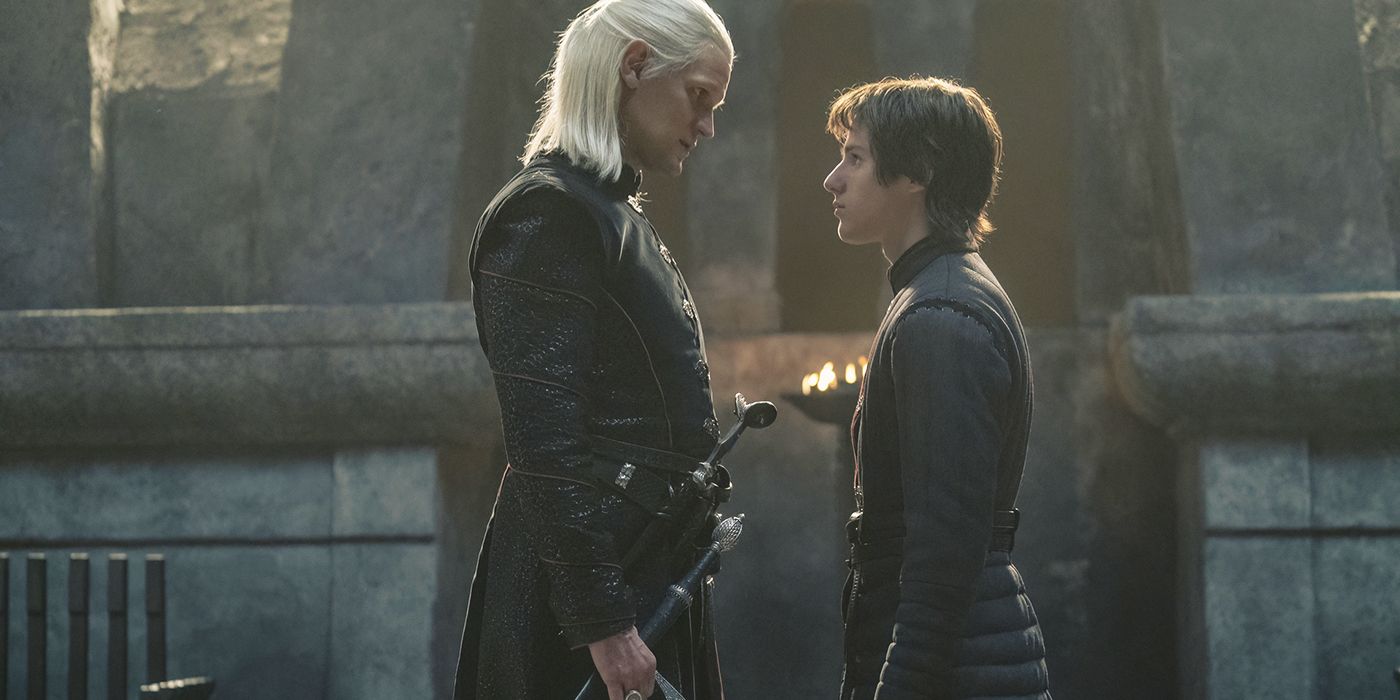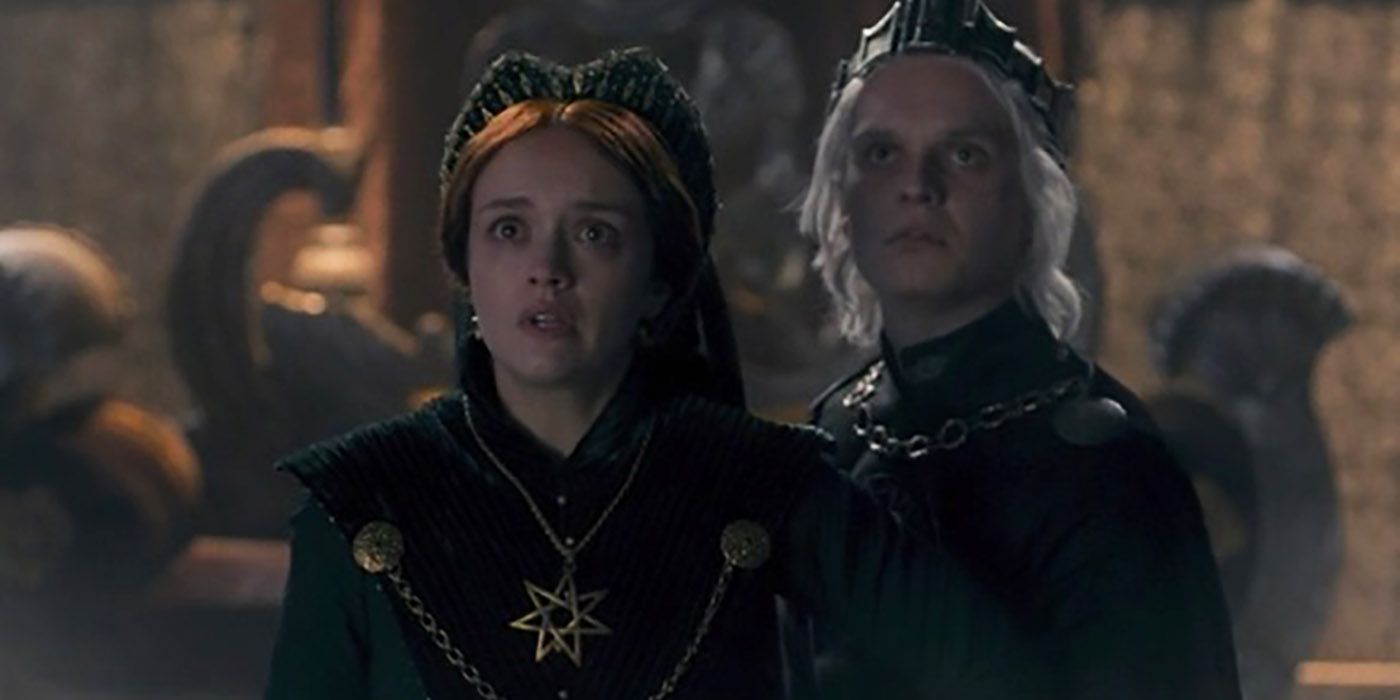After the announcement that House of the Dragon Season 2 would consist of a mere eight episodes, it's hard not to ask a simple and distressing question: is history repeating itself? Season 1 of the Game of Thrones prequel already felt underserved with 10 episodes, a classic case of too much plot crammed into far too short a timeframe. You'll remember Game of Thrones ran for six seasons of 10 episodes apiece until Season 7 dropped to seven episodes, followed by Season 8's bare minimum of six. As we know, the show's quality spiraled down alongside those descending numbers. Despite the House of the Dragon and Game of Thrones creative teams not overlapping, I shudder to think a nightmarish Groundhog Day is breathing down our collective necks.
Let's take a moment to not be ultimate doom-harbingers by acknowledging how Season 1 of House of the Dragon shined in many ways. When the Emmy nominations come calling, Dragon's full cast and entire production crew deserve to hear their names announced. And, debates up and down the internet aside, the series was an indomitable hit for HBO that restored Thrones's legacy after Season 8's different legacy threatened to undermine years of goodwill.
In the same breath, there are as many ways — significant and minor — that House of the Dragon's execution could have afforded George R.R. Martin's rich tapestry an opportunity to play out to its fullest potential
‘House of the Dragon’ Could Have Started Earlier
For one, Dragon had the option of starting earlier in the Targaryen dynasty. The dragon family's rule spans several centuries, beginning with Aegon the Conquerer's forced unification of the Seven Kingdoms (itself an appropriately cinematic tale!). Martin's 2018 novel Fire & Blood depicts events from Aegon's conquest through the reign of King Aegon III and serves as the basis for House of the Dragon. In an October 2022 interview, Martin revealed his interest in setting the story 40 years before the premiere episode:
"I would've begun it like 40 years earlier, with an episode I would've called 'The Heir and the Spare. Jaehaerys' two sons, Aemon and Baelon, are alive, and we see the friendship but also the rivalry between the two sides of the great house. Then Aemon dies accidentally when a Myrish crossbowman shoots him by accident on Tarth, then Jaehaerys has to decide who becomes the new heir. Is it the daughter of the son who's just died, or the second son who has children of his own and is a man where she's a teenager? You could've presented all that stuff, but then you would've had 40 more years, and even more time jumps and recastings. I was the only one who was really enthused about that."
Although ignoring Martin's suggestion isn't House of the Dragon's biggest misstep, it's an early indicator of the series' greatest weakness: telling, not showing. Season 1 condenses mountains of plot at the expense of practically every other element. It uses dialogue as a shorthand to convey unseen history, so it can jump from point A to B (more like A to D). Since succession would always be the point of contention, why not depict the issue of Princess Rhaenys (Eve Best) versus Prince Viserys (Paddy Considine)? There may not be dragon battles, but the political scrimmage is rancorous enough. Eve Best's performance leaves no doubt as to Rhaenys's suitability for the Iron Throne and her acceptance of Westeros's misogyny, but I, for one, would've loved to see a younger version establish herself as a formidable force. Likewise, a fleshed-out relationship between Viserys and Daemon Targaryen (Matt Smith) holds enough drama to fill a season on its own merit.
Most importantly, there's almost no better way to drive home the tragedy of the Dance than by watching one mini-succession crisis unfold only for history to actually repeat itself with Rhaenys and Viserys's descendants. Audiences might care even more about the Dance after forming attachments to the participants' parents/grandparents. Either way, the build to the Dance is as inevitable as it is appalling, between Westeros's contempt for women and a family that solves its problems with dragons.
Plan B: Relax With the Time Skips, Y’all
Alternatively, the easiest fix for House of the Dragon was to start the same but chill out with the time skips. Just stretching out the aftermath of Viserys and Alicent's (Emily Carey and Olivia Cooke) engagement could have solved the season's most glaring inconsistencies. Rhaenyra (Milly Alcock and Emma D'Arcy) and Alicent's relationship is the series' backbone. Audiences needed to behold the painful degradation of a youthful friendship to understand (and appreciate) how girls who lay their heads in one another's laps and dreamed of riding dragons together became adult women who sanctioned heinous acts against an enemy.
Two scenes — an argument and Rhaenyra helping Alicent dress for the wedding, respectively — were filmed but deleted from the final cut. Instead, the narrative leapfrogs from one emotional outcome to the next without depicting key steps along the way to said result, or letting much of anything breathe. The back half of the season is the worst offender on this score. We're meant to intimate that the ten years Rhaenyra spent in King's Landing between Episodes 5 and 6 burned the fire out of her, and that Alicent's psychological torment was the main cause. Once again the writers employ their friends Mr. Exposition and Ms. Read Between the Lines when devoting just an additional episode or two would've provided clarity to both women's changed demeanors.
Although Rhaenyra's agonized loneliness (and subsequent healing on Dragonstone) comes through in her reunion with Daemon, Alicent suffers the most from this time skip. Her outburst of repressed rage, as well as her vehement need to protect her children from death, isn't earned without more than Rhaenyra's children and a past lie about her sex life. Like the best A Song of Ice and Fire characters, Alicent is neither a villain, a hero, nor a spoiled child. Like the best A Song of Ice and Fire situations, this is a tragedy of errors on all sides — especially since Alicent and Rhaenyra seem poised to tentatively reunite before Viserys's death. Their fractured relationship deserved the bite of a dragon's entire jaw.
Secondary Characters Suffered From Lack of Screen Time
Another victim of the time skips is the glorious Laena Velaryon (Savannah Steyn and Nanna Blondell). Her ending improves upon the book and her presence looms large at the same time she's sorely underutilized. Why not depict more of the delicacy between her and Daemon, and/or her teaching her girls? It's hard to feel a loss's impact when the character is barely onscreen. They made time for Episode 9's foot scene over developing a powerful woman of color?
All the child characters deserved similar time to grow. It's hinted that Rhaenyra and Aegon's kids were initially friendly before social pressures pushed them apart. That's a superb recipe for a mini-tragedy between the groups that echoes Rhaenyra and Alicent's early days, especially since the story of the Dance is as much about that generation as the prior. The deleted scenes come into play here again for Episode 10; Baela (Bethany Antonia) and Rhaena (Phoebe Campbell) become fierce dragonriders, the former especially, and an interaction between her and Rhaenys hints at Baela's future.
Even Daemon Wasn’t Safe From Mistakes
To add a touch of insult to injury, the House of the Dragon social media pages repeatedly teased a deleted scene of Daemon comforting his daughters after Laena's death. Daemon would always be polarizing, but much of the internet's discourse mischaracterizes him from one extreme to the next without accounting for nuance. Few in Martin's world are true villains. Most are antiheroes with conflicting motivations at best. Including tender scenes of Daemon hugging his twins or mourning baby Visenya's death while comforting Rhaenyra would've provided the balance he needs (and Smith's performance warrants!) rather than implications, interviews, and reading into performances. The Dance doesn't hold as much resonance when oversimplified characters make it too easy to declare for one team versus the other based on personal taste.
Some Stories Demand Slower Pacing
If the writers indeed slashed Season 2 to eight episodes for character reasons, we can hope (but place our exhausted bets) it's because they're course-correcting and taking the time to lay out every piece without sacrificing choice necessities. Fire & Blood only gets denser and more nuanced, just like the rest of Martin's work. The man himself specified out four ten-episode seasons for the Dance, and that was with one season already on fast-forward. There are too many new characters to cover, too many arcs to develop, themes to centralize, iconic moments, and upcoming dragon battles. Perhaps it wouldn't be such a worry without the franchise's clear precedent of either rushing, leaving core elements on the cutting room floor, or both.
Some stories demand slower pacing. Proper build-up leading to a superior pay-off is a core tenant of storytelling. Instant gratification is just that: instant. Did we learn nothing from Game of Thrones Season 8?

